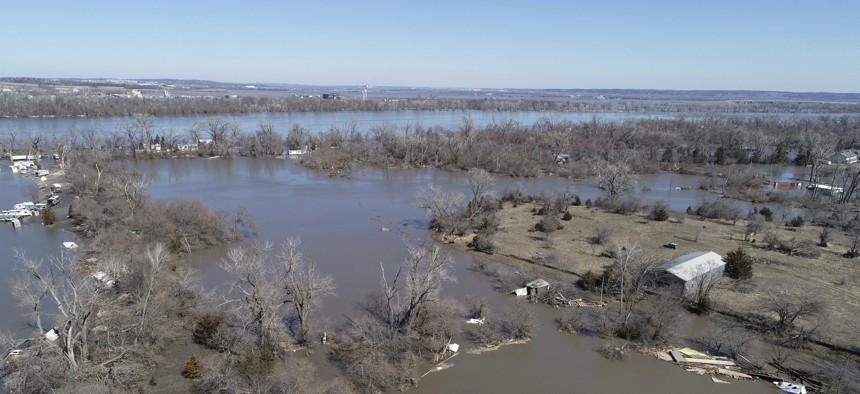Oglala Sioux Tribe Calls for Help in South Dakota as Flooding Continues

This Wednesday, March 20, 2019 aerial photo shows flooding near the Platte River in in Plattsmouth, Neb., south of Omaha. AP Photo
STATE AND LOCAL ROUNDUP | Lawmakers consider changes to Medicaid expansion in Idaho ... Cracking down on uninsured drivers in Oklahoma ... Oregon lawmakers ponder a pay raise.
People remain trapped in their homes on the sprawling Pine Ridge Indian Reservation in South Dakota as flooding continues along the Mississippi and Missouri Rivers. About 8,000 people on the reservation lost water service, while Gov. Kristi Noem called in the National Guard to help deliver water. Oglala Sioux Tribe officials said they don’t have the staff to deal with the crisis, where some people have been running low on supplies in far-flung parts of the reservation. Some have criticized Noem for not providing assistance earlier, the New York Times reported, but the governor said she activated help when the tribe made a formal request for assistance. Noem visited the reservation over the weekend. While flood waters have receded in many places in Nebraska and Iowa, it continues downriver in Missouri and, further south, in the Mississippi Delta. About 7,500 people were evacuated from the riverfront town of St. Joseph in Missouri. In Mississippi, some residents of a Vicksburg subdivision have evacuated fearing river flooding, while backwater flooding has been affecting some rural farm communities for more than a week. [Keloland.com; New York Times; Newscenter1; St. Louis Post-Dispatch; Kansas City Star; Clarion Ledger]
MEDICAID CHANGES | Idaho House members passed legislation that would scale back the Medicaid expansion approved by voters in November, as well as add work requirements for many recipients. The bill, which is backed by many Republicans, would ask the federal government to allow the state to cover people whose families have incomes up to 100 percent of poverty in Medicaid, while expansions normally go up to 138 percent of poverty. Those in between would be directed to the state insurance exchange, where they would have to buy a policy. State Rep. Wendy Horman, a Republican House member from Idaho Falls, said the legislation will help control costs, according to the Post Register. “It has important fiscal sideboards on it that will help us manage this expansion in a way that’s fiscally responsible for those of us who are being served, as well as Idaho taxpayers,” she said. But Rep. Ilana Rubel, a Democrat from Boise, said the proposal would “upend one of the most thoroughly vetted pieces of policy that I’ve seen in seven years and replace it with this half-baked scheme, if you will.” The work requirements under discussion are similar to those in effect in Arkansas, one of several states to receive permission from the Trump administration to implement the policy—but the only one so far to have acted on it. About 18,000 people last year were kicked off Medicaid in that state for failure to comply. In Idaho, a different version of a Medicaid bill is being considered in the Senate, with a committee instead moving forward with a voluntary work training program instead of requirements. [Idaho Statesman; Post Register]
NO INSURANCE | A new license plate scanning program in Oklahoma is responsible for the state sending out 14,000 notices since November to drivers believed to be uninsured. Almost 950 people have paid a fine and purchased car insurance because of the program. [Tulsa World]
CLEAN ENERGY | New Mexico Gov. Michelle Lujan Grisham signed the first state law that lays out a state commitment to eliminating carbon emissions from the energy grid over the next 25 years. The sale of bonds will pay for closing a coal-fired power plant, while the state will pay for retraining workers. [Albuquerque Journal]
PAY RAISE | Oregon lawmakers are pondering a big raise for state lawmakers, who make $31,200 annually, plus a $149 per diem during legislative sessions. The idea is a $20,000 pay increase would enable a more diverse slate of candidates to be able to run for office, proponents say. [Associated Press]
ARRESTED MAYORS | The small town of Port Richey in Florida is looking for new City Council members following the arrests of the last two mayors. Pasco County registered voters and Port Richey residents are asked to appear at the next council meeting to be considered until a special election is called. A key condition: candidates can’t have past felony convictions or a record of a “crime of moral turpitude.” [Tampa Bay Times]
Laura Maggi is Managing Editor of Route Fifty and is based in Washington, D.C.
NEXT STORY: How Poor Americans Get Exploited by Their Landlords






